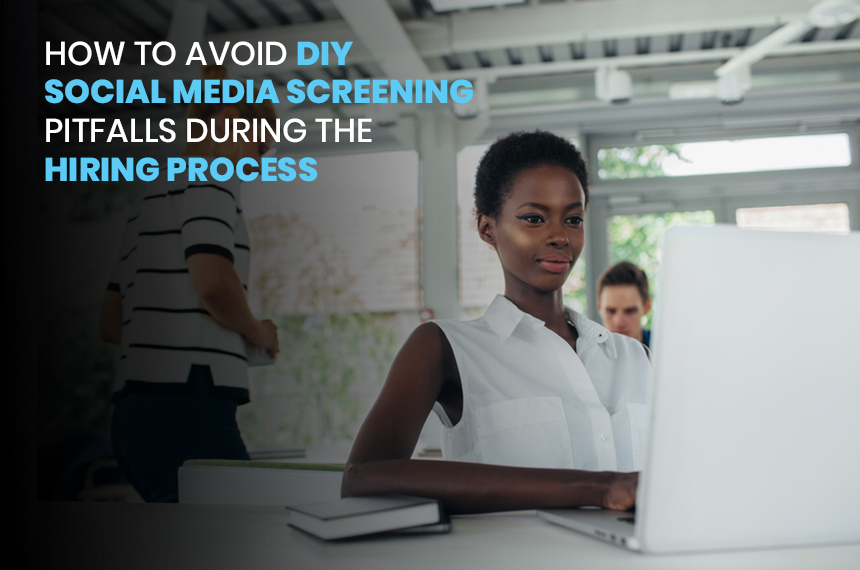Social media screening has become an important part of the process of employee recruitment across a wide variety of industries. Our use of it has influenced how we hire people — 90% of employers believe that social media is important when evaluating candidates for the position.
Social media background checks can help you make smarter hiring decisions and enhance your recruitment processes. They are effective in screening candidates who might be a bad fit for the job or pose a security and reputational risk.
Many employers are relying on their in-house HR teams or hiring managers to conduct online social media searches to learn more about their candidates. However, there are a lot of hazards associated with DIY social media screening, including noncompliance with the law, possible legal implications and the introduction of bias.
How do you harness the effectiveness of social media screening while avoiding legal implications? Read on for our tips on avoiding social media screening pitfalls and what you should do instead.
DIY Social media screening pitfalls you should avoid
In-house social media checks can be a very grey area for employers. The pitfalls of doing this have very tangible effects on both your candidates and organisation. Below are DIY social media screening pitfalls to watch out for.
Breach of privacy
Job candidates can access information on an organisation’s recruitment process under the Privacy Act 1988. This includes information gathered through social media sites about them and stored on an employer’s file for future reference.
Organisations are legally required to make the candidate aware that they are collecting personal information about them as well as their purpose for doing so and the entities that have access to the information.
Personal bias and assumptions influencing a candidate’s employability
Recruiters who use social media to source irrelevant personal information or information pertaining to a particular attribute of a candidate create the risk of a potential claim for discrimination. At the same time, recruiters might unintentionally chance upon very personal information (for example, some stating their sexuality on their Instagram bio) and this runs the risk of triggering unconscious bias from the recruiter’s end.
Under the Fair Work Act 2009, there is the possibility that an unsuccessful applicant could make a claim against the employer for adverse action as a consequence of using their personal information.
DIY checks do not have systems in place to remove information that could lead to bias or discrimination. It stands to reason that employers will find it difficult to prove that they did not use the information gathered in a DIY social media screen in an employment decision to not hire a candidate.
The applicant, under the law, can contest this decision, which might lead to legal action.
It is easy to get caught up in your own biases, unconscious or not, and assumptions about people, so it is important to not base your hiring decisions on what or who you think they are.
A negative impact on candidate experience
Your candidates’ experience can impact your organisation’s reputation and brand whether they are hired or not. Employers must preserve integrity and all other positive elements in a candidates’ experience to avoid the risk of negatively impacting it.
Open and honest communication is essential for a positive candidate experience. They value transparency during the hiring process, which is why it’s necessary to be transparent with your candidates about your social media screening process and obtain their consent to a check.
Your candidates should feel confident that your process is compliant, respects their privacy and removes any potential for bias. Without this they may believe you’re basing your hiring decision on criteria that is not relevant to their potential employment.
What to do instead: Hire a third party to conduct social media screening
There are benefits to hiring a third party to conduct social media checks that organisations should not miss. They can offer specialised expertise and AI technology to help protect organisations from accessing the unlawful information, while still delivering strong, insightful results.
These benefits include:
- Increased insights
- Saved time
- Hiring managers never seeing protected personal information
- Removal of bias
- Improving employer’s reputation
- Increased chances of finding the right candidate based on cultural fit
- Protection of organisations from reputational and financial risks as well as legal implications
Work with CheckSocial
CheckSocial is a platform that automates the effort of manual searches, removes the risks involved and provides organisations with comprehensive and compliant reports that highlight any red flags in their candidates’ online activity.
We are revolutionising the hiring process, with social media screening and digital footprint checks that provide powerful candidate insights.
To support you and your recruitment process, we’ve prepared a free, downloadable eBook that has been written for forward-thinking HR professionals. It offers the complete guide to digital footprint checks and will answer all your social media check questions.
Get your free copy of The Ultimate Guide to Digital Footprint Checks now.
